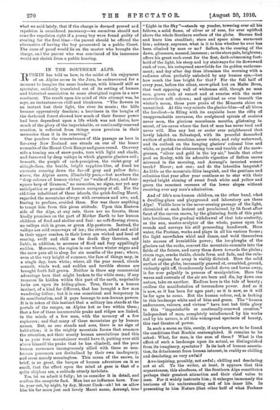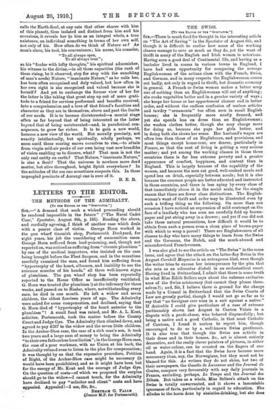IN THE SOUTHERN ALPS.
RUSKIN has told us how, in the midst of his enjoyment of an Alpine scene in the Jura, he endeavoured for a moment to imagine the same landscape, with himself still as spectator, suddenly translated out of its setting of human and historical association to some aboriginal region in a new continent. The result upon his mind of this attempt was, he says, an instantaneous chill and blankness. "The flowers in an instant lost their light, the river its music; the hills became oppressively desolate; a heaviness in the boughs of the darkened forest showed how much of their former power bad been dependent upon a life which was not theirs, how much of the glory of the imperishable, or continually-renewed creation, is reflected from things more precious in their memories than it in its renewing."
One ponders the remembrance of this passage as here in far-away New Zealand one stands on one of the lesser summits of the Mount Cook Range and gazes round. On every side a tossing sea of snow-peaks, torn with light and shade, and furrowed by deep valleys in which gigantic glaciers coil ; beneath, the purple of rock-precipices, the violet-grey of shingle-fans, the braids, bright sapphire-blue, of freed ice currents running down the far-off grey and yellow flats ; above, the Alpine azure, illimitably pure,—but nowhere the " deep colours of human virtue," no "walls of Joni, and four- square keep of Granson," no memories, no signs, nor yet any anticipation or promise of human occupancy at all. For the old-time inhabitant of these islands, the quick-feeling Maori, regarded the mountains always with reverence and awe, and, fearing to profane, avoided them. Nor was there anything to tempt him from this pious attitude. Upon this Eastern side of the Alps, at any rate, there are no forests, those kindly promises on the part of Mother Earth to her human children of food and shelter and fuel : no soft-flowing rivers, no valleys rich in grass, or green Alp-pastures. Instead, the valleys are cold causeways of ice; the rivers, silent and solid in their upper reaches, in their lower are wicked and loud of roaring, swift and chill as the death they threaten, and liable, in addition, to accesses of flood and fury appallingly sudden. Moreover, the region is one where winter reigns and the snow puts all to sleep for six months of the year; where, even at the very height of summer, the face of things may, in a single day, turn white; where, all the year round, clouds consult, winds wed, and sudden and terrible storms are brought forth full grown. Neither is there any commercial advantage here that might beckon to the white man; if any treasure lie hidden within this part of the earth, unprisable locks are upon its hiding-place. True, there is a human instinct, of a kind far different, that has brought a few men wandering hither; but it is one occasional and temporary in its manifestation, and it pays homage to non-human powers. It is in token of this instinct that a solitary inn stands at the portals of the ranges, an Alpine but or two within them ; that a few of these innumerable peaks and ridges are linked, in the minds of a few men, with the memory of a few explorers ; and that many of these mountains go by human names. But, as one stands and sees, there is no sign of habitation; it is the mighty mountain forms that summon the attention, not their scanty human associations (and this is as your true mountaineer would have it, putting ever still above himself the peaks that he has climbed), and the poor human surnames incongruously allied with these so non- human presences are devitalised by their own inadequacy, and seem merely meaningless. This ocean of the snows, in brief, is so great, the barque of human adventure on it so small, that the effect upon the mind at gaze is that of a quite shipless sea, a solitude utterly inviolate.
Yes, let us admit it fully; let us consider it in detail, and confess the complete fact. Man has no influence here. Year in, year out, by night, by day, Mount Cook—ah l let us allow Lim his far more just and lovely Maori name, Aorangi, true "Light in the Sky "—stands up yonder, towering over all his fellows, a solid flame, of silver or of rose, for ever uplifted above the whole Southern surface of the globe. Storms find and leave him steadfast; stars and space alone surmount him ; solitary, supreme, what is it to him whether he ever has been climbed by man or no ? Sefton, to the coming of the dawn, glimmers, massed, immense ; as the stars pale, brightens; offers his great rock-crest for the first, dark-crimsoning foot- hold of the light, his steep and icy stairways for its downward rush of rose, his outspread snowfields for its golden enthrone- ment; and day after day thus illumines the morning with a radiance often probably unbeheld by any human eye,—but how much the less bright for that P For the full half of every year, before the silent, snow-piled but on Malta Bran, that vast opposing wall of whiteness still, though no man sees, grows rich at sunset and at sunrise with the most marvellous soft colours; and spiritual as ever beneath the winter's moon, those pure peaks of the Minarets shine on unwatched. At this very minute the glacier-blue—of all blues the loveliest—is filling with its exquisite haze the rifts of unapproachable crevasses, the sculptured spirals of couloirs never seen, the glorious moonbeam mouths, glistening in secret, of ice-caves where the foot of man has never trod and never will. Has any but or meter ever neighboured that lovely lakelet on Sebastopol, with its peaceful damasked surface of golden sunshine, azure water, and ruby waterweed, and its outlook on the hanging glaciers' colossal blue and white, or parted the shimmering toss and tumble of the snow- grasses, " silver and gold in the icy air," beside that other pool on Seeley, with its adorable vignettes of Sefton snows mirrored in the morning, and Aorangi's inverted sunset torch? Never; not one; and do the lakesides languish? As little as the mountain-lilies languish, and the gentians and celmisias that year after year continue so to star with their myriad bright shining of sweet fresh white and yellow and green the remotest recesses of the lower slopes without receiving ever any man's admiration.
And of life's non-human children, on the other hand, what a dwelling-place and playground and laboratory are these Alps! Visible here is the never-ceasing passage of the light, chronicled at each instant and proclaimed, by lit facet after facet of the carven snows, by the glistering forth of this peak into loveliness, the gradual withdrawal of that into austerity, as the sun, master-sculptor of the whole, passes upon his rounds and surveys his still proceeding handiwork. Here water, the Protean, works and plays in all his various forms ; the light snowflakes whirl and dance, and weld themselves into masses of irresistible power; the ice-ploughs of the glaciers eat the rocks, convert the mountain-summits into the fields of the future, and carry them down towards the plains; rivers rage, creeks tinkle, clouds form and fade, and the rain- fall of regions far away is visibly dictated. Here the solid surface of the globe, incessantly gnawed at, crumbled, ground, violently split off, thunderously hurled down and borne away, is for ever palpably in process of manipulation. Here the waves and currents of the air are born and die, lay down one nature, take on another. Endless here is the tale of beauty; endless the manifestation of tremendous power. And as it is now, so it has been for ages past; as it is now, so it will be for ages to come. But the human colour, red, is lacking to this landscape white and of blue and green. The "human endurances, velours, and virtues " have lent but little glory to this " imperishable or continually-renewed creation." Independent of man, completely uninfluenced by his works and by his nature, is all this widespread spectacle of beauty, this vast theatre of power.
In such a scene as this, surely, if anywhere, are to be found the conditions that Ruskin contemplated. It remains to be asked: What, for man, is the sum of them ? What is the effect of such a landscape upon its actual, as distinguished from its imaginary, spectator? Is its lack of human associa- tion, its detachment from human interest, in reality so chilling and desolating, so very awful?
Awe-inspiring, possibly, not awful; chilling and desolating not at all. To the writer, at least, it appears that this separateness, this aloofness, of the Southern Alps constitutes perhaps their greatest attraction and their chief value to man. For it widely instructs him; it enlarges immensely the horizons of his understanding and of his inner life. In presenting to him Nature (that other half of what Fechner calls the Earth-Soul, at any rate that other sharer with him of this planet), thus isolated and distinct from him and his occasions, it reveals her to him as an integral whole, a true existence, an individual something in terms of her own self, not only of his. How often do we think of Nature so ? As man's slave, his tool, his convenience ; his nurse, his consoler, "To all always open, To all always true";
as his "feeder with lofty thoughts," his spiritual admonisher, his witness to the divine,—in all these capacities (the rank of them rising, be it observed, step for step with the ennobling of man's needs) Nature, " inanimate Nature," as he calls her, has been often recognised and duly valued, but how often in her own right is she recognised and valued because she is herself ? And yet to exchange the former view of her for the latter is like taking that great step up out of mere grati- tude to a friend for services performed and benefits received, into a comprehension and a love of that friend's faculties and character as they are in themselves, above and past the limits of our needs. It is to become disinterested—a mental stage often as far beyond that of being interested as the latter beyond that of being uninterested—and, in paradoxical con- sequence, to grow far richer. It is to gain a new world, because a new view of the world. Not morally precisely, not exactly intellectually, but spiritually, vitally perhaps, we seem amid these soaring snows ourselves to rise,—to attain from virgin mid-air peaks of our own being vast new breadths of vision enabling us to discern, what ? That man is not the only real entity on earth ? That Nature, " inanimate Nature," is also a Soul? That the universe is nowhere mere dead matter, but alive throughout, bright Spirit everywhere ? In the solitudes of the sea one sometimes suspects this. In these unpeopled precincts of Aorangi one is sure of it.
B. E. B.







































 Previous page
Previous page